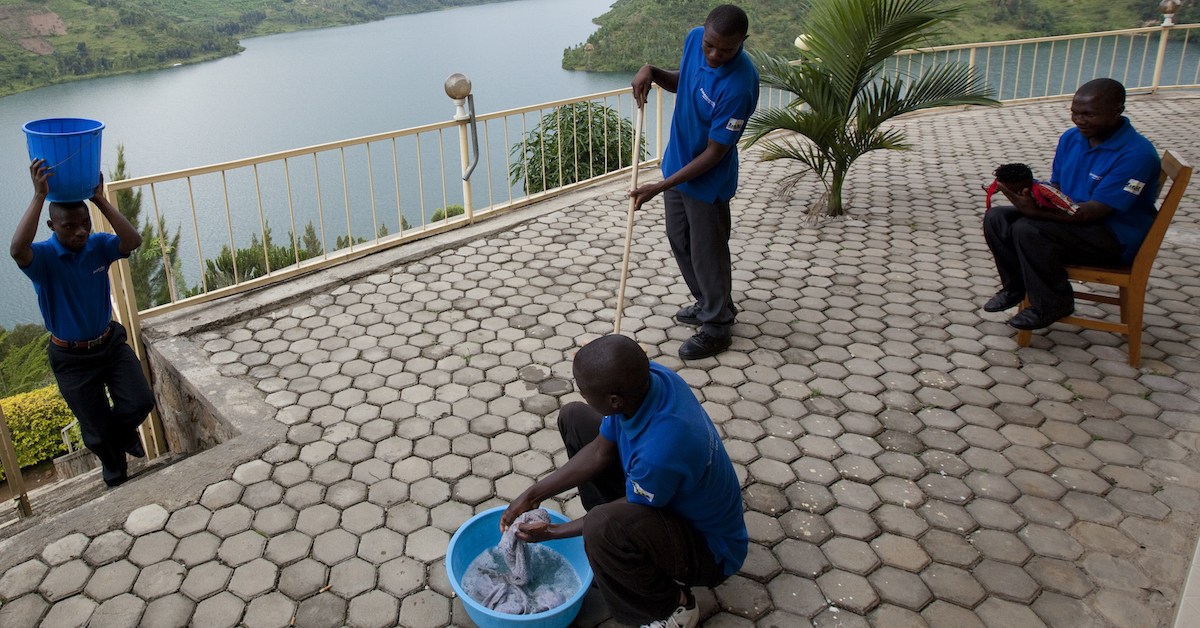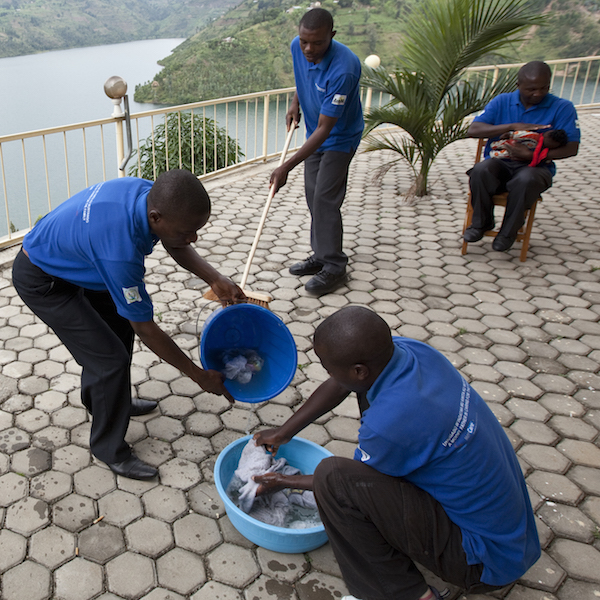On International Women’s Day (and every day after), men should get their hands dirty for gender equality.

By Gary Barker
This blog was originally posted in New America.
I hear it again and again: “Men won’t do that.”
That, in this case, refers to housework: cooking, cleaning, wiping up, changing messy diapers and all that stuff. These opinions aren’t just expressed by a few men in passing–they’re felt at the highest levels. At the United Nations, and in governments around the world, when I suggest that men and boys need to do our share of the childcare and chores to achieve equality for women at work, I am frequently met with a look that says: Are you crazy? That will never happen.
These opinions have enormous implications — for everyone. On International Women’s Day, as we’re asked to pledge our support for women’s leadership and equality at work, we cannot ignore what’s happening at home. Though it may sound trivial to talk about who does the laundry, cleans the house or cares for children, it is arguably the key factor that holds back women’s advancement in work and politics.
Globally women spend about double the time that men do on unpaid care work: 4.5 hours on average to men’s 2 hours. This means that while women are caring for children, cleaning, and cooking, men and boys have more time for leisure and to advance their careers. This reality is so pervasive that a recent advertisement for laundry detergent, which dramatized a father’s realization that his now-married daughter was living out the same inequalities he had modeled for her growing up, has gone viral with the hashtag #ShareTheLoad.
So the equation is changing, but far too slowly. In Brazil, for example, at this rate it will take 80 years to achieve equality between men and women when it comes to care work.
Here’s why I believe men and boys can get to 50 percent of the care work: because around the world — and under the radar — many men and boys are already doing it.
First and foremost, the unequal burden of that women take on means that they continue to earn about 24 percent less than men worldwide for the same work. This inequality in who cleans, cooks, takes care of children and the elderly keeps women and girls from the education they deserve. This isn’t just an issue for individual men and women: estimates show that the global economy would grow as much as US$28 trillion by 2025 if women participated in paid work at the same level as men do.
I’ve been called a traitor to my sex when I suggest that my fellow men have to do their part. Other times, I’ve been called a blind optimist for believing that change is possible. Here’s why I believe men and boys can get to 50 percent of the care work: because around the world — and under the radar — many men and boys are already doing it.
In Mozambique, for example, the organization Rede Homens Pela Mudança (Men for Change) is offering cooking classes for men — not to become professional chefs, but to take on their share of the daily cooking. And the men are coming to class. In Bangladesh, the Brave Man Campaign helps younger boys to support their mothers and sisters — and to slowly start conversations with their fathers about why men and boys need to do their share. In Brazil, my organization Equimundo offers continuing education for teachers that helps them to address gender equality in the classroom, including on sharing the care. We’ve also partnered with Brazil’s Ministry of Health to develop online training for health workers on how to work with men on taking care of their children from the beginning. In Rwanda, along with our partners, we are offering parenting classes for men. In a part of the world where men are not expected to care or even touch newborns, offering hands-on classes on infant and child care are going a long way to change that norm.
These approaches are still far too small to tip the global scales, but they are a start. And change doesn’t have to look the same everywhere to make a difference. In some contexts, for example, men start doing their share of care work because they have no choice: families just don’t have the option to designate a breadwinner and a caregiver when they’re struggling to get by. And in others, men are seeing the obvious need to take on more at home as women continue to take on more paid work.
There are tipping points when men start to see doing this work as normal: when we start to see other men in prenatal waiting rooms, in the delivery room, in daycare centers, and carrying their children in public spaces. When men see other men doing the care and domestic work they are more likely to do it too. In nearly 20,000 interviews Equimundo and partners have carried out around the world as part of the International Men and Gender Equality Survey (IMAGES), we consistently see — from India to Mexico to Croatia — that men who saw their fathers or other men in the household do care work when they were children are more likely to do their share they have their own families.
So what can we do to make sure we’re not having this conversation in 2096?
The challenge of course is how to speed it up the change — how to reach the tipping points sooner. Eighty years to achieve equality in Brazil, for example, is unacceptable. So what can we do to make sure we’re not having this conversation in 2096?
Parental leave policies are a start. In countries where most of the workforce is in the formal workforce (collecting a paycheck), they are an effective driver of change, especially when they provide paid leave for both mothers and fathers. A new study of 22,000 companies in 91 countries finds that offering leave for fathers is positively linked to women’s corporate leadership (at the boardroom and at the executive level).
Campaigns and media that show men doing the care work can also achieve change — and help to move the needle on how we define fatherhood, as can programs that teach boys and girls that care work is part of all of our lives. Education programs, like the ones above, as well as those that invite men to be part of women’s economic empowerment programs, health initiatives, and more can help communicate social and cultural expectations of gender equality. And high-profile figures can take up the mantle as role models. It wouldn’t hurt to see some male heads of state, top military brass, or high-profile celebrities actively caring for their children, for example. And I mean more than playing with children. Let’s see some more famous men taking time off from work to do the hands-on care — including the really messy stuff.
Here’s another secret: Let’s show men what they get out of doing this. Overall, our IMAGES study confirms that from Norway to Rwanda, men who do their share of care work are happier men. It also finds that women are happier with men when their male partners do their fare share of care work, including happier sexually. Funny how that last part often gets men’s attention.
We also need to show workplaces, corporations and policymakers again and again why this is important. For that, the answer is simple: economies thrive when women thrive and are free to work and get the education they deserve. Workplaces are more diverse and have more women in leadership positions when men are taking time off to be parents. We need to tell finance ministers that if they want to give their countries a boost, among other things they need to free up the labor power women and girls — and they should feel good about promoting equality along the way. The only way to achieve all of this is by having boys and men do our share of the care work.
On International Women’s Day, I’m often asked to speak about what men and boys can do for gender equality and to empower women and girls. The answer is as simple as it is complicated. Pick up the broom–or these days, the Swiffer. Or pick up the baby, or the trash bin, or all of it. Do it today, and keep doing it every day after that. Every time we as men do our share of care work, our sons and daughters see our fundamental respect for women and girls as our equals, and women are that much closer to reaching equality at work. I believe men can do that.
